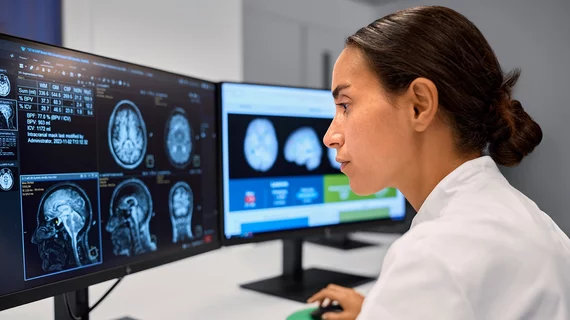American College of Radiology partners with AI developer, seeking to improve Alzheimer’s diagnoses
The American College of Radiology on Wednesday announced a rare “strategic collaboration” with a commercial imaging artificial intelligence vendor.
ACR is teaming with Leuven, Belgium-based Icometrix in a bid to improve the quality of care for patients with dementia. Together, they’ll provide the company’s AI-based MRI quantification software to imaging facilities participating in the Alzheimer’s Network for Treatment and Diagnostics.
ALZ-NET, as it’s called for short, is sponsored by the Alzheimer’s Association and operated by the ACR. It functions as a voluntary healthcare provider network, collecting data from individuals evaluated and treated using novel U.S. Food and Drug Administration-approved therapies.
“This collaboration is an important step toward ensuring that patients receive safe, effective care as new Alzheimer’s treatments are introduced,” Ana M. Franceschi, MD, PhD, chair of the ACR Neuroradiology Research Committee and director of dementia imaging at Northwell Health, New Hyde Park, New York, said in a statement.
In addition, the college and Icometrix also will collaborate on several educational initiatives. The FDA in recent years as approved new anti-amyloid drugs Leqembi and Kisunla, aimed at slowing the progression of the degenerative disease by removing plaques in the brain. However, these treatments require regular monitoring, ACR noted, including brain MRIs to support diagnosis and to detect side effects such as Amyloid-Related Imaging Abnormalities (ARIA).
Icometrix developed its new Icobrain Aria solution to aid radiologists in these tasks, scoring FDA clearance in November. ACR noted this is the “first and only” AI software that automates the quantification and grading of ARIA-E (edema/sulcal effusion) and ARIA-H (hemorrhage/superficial siderosis). The software also can calculate severity scores, “empowering radiologists and neurologists to assess cases accurately and prescribe anti-amyloid treatments with confidence.”
“Well validated AI solutions, such as Icobrain Aria, are crucial for the safe monitoring of Alzheimer’s patients on therapy,” said Salvatore Napoli, MD, medical director, Neurology Center of New England, in Foxboro, Massachusetts, an ALZ-NET participating site. “As most of my patients are scanned in several outside imaging centers, the use of Icobrain helps me a lot with the standardized brain MRI interpretation and communication with the radiologists.”
Participating ALZ-NET imaging facilities will receive discounted access to Icobrain Aria, ACR noted. They’ll also be able to use CPT (Current Procedural Terminology) codes 0865T and 0866T when billing for use of the software. The American Medical Association in 2023 issued codes tied to Icobrain based on clinical evidence of its efficacy, ACR said.
Icometrix was founded in 2011, and its technologies are now used in over 300 hospitals worldwide. The company has raised over $24 million from investors, according to PitchBook, including nabbing $18 million in 2019 through a partnership with Forestay Capital, Optum Ventures and Capricorn Venture Partners.

